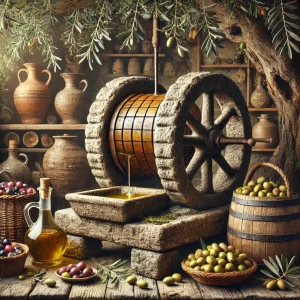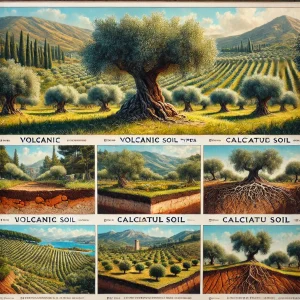Make It Liquid Gold
Ever wonder why some olive oils taste like a walk through a Mediterranean orchard while others fall flat? The journey from olive tree to bottle is an art form, steeped in tradition and influenced by nature. Here are five fascinating secrets about olive oil production that reveal why this liquid gold is so special.
1. The Importance of Early Harvest in Flavor Profiles
Did you know that the timing of the olive harvest can dramatically change the flavor of the oil? Early-harvest olives are picked while they’re still green, resulting in oil with a bold, peppery kick and a vibrant green color.
Why It Matters: Early-harvest oils are packed with polyphenols, powerful antioxidants that contribute to the oil’s health benefits and its distinct taste. These oils tend to be more robust and have a longer shelf life compared to late-harvest oils.
Fun Fact: While early-harvest oils have intense flavors, they yield less oil. This makes them pricier but well worth the investment for true olive oil aficionados.
Whimsical Thought: Think of early-harvest olives as the eager overachievers of the orchard—they’re small but mighty!
2. How Weather Impacts Olive Yields
Olive trees are deeply connected to their environment. A hot, dry season can stress the trees, leading to smaller, more concentrated olives, while a wet, cool season may dilute flavors.
The Science: Weather conditions during the growing season affect the oil’s acidity, flavor, and aroma. Extreme weather, like frost or hail, can even damage the fruit, reducing overall yield.
Real-Life Insight: Farmers in regions like Italy, Greece, and Spain closely monitor weather patterns to decide the best time to harvest, ensuring the highest-quality oil.
Whimsical Thought: Picture olive trees as divas—they demand just the right amount of sun and rain to perform their best.
3. Why Cold Pressing Is Essential
Ever wonder what “cold-pressed” means? It’s not just a fancy term—it’s a crucial step in making high-quality olive oil.
How It Works: Cold pressing involves extracting oil from olives without using heat, which can degrade nutrients and flavor. The process keeps the temperature below 80°F (27°C), preserving the oil’s natural antioxidants and delicate aromas.
Scientific Nugget: According to Wikipedia, cold pressing ensures that the oil remains extra virgin, the highest quality grade of olive oil.
Fun Fact: In ancient times, olive oil was pressed using massive stone wheels. Today’s methods are more modern but still prioritize preserving the oil’s integrity.
4. The Role of Regional Soil in Unique Flavors
The saying “terroir matters” isn’t just for wine. The soil where olive trees grow plays a significant role in the oil’s flavor and character.
How It Works: Soil composition, mineral content, and drainage affect the olives’ growth and, ultimately, the oil’s taste. For example:
- Volcanic soils: Found in regions like Sicily, these soils produce rich, complex oils with earthy undertones.
- Calcareous soils: Common in Greece, they yield oils with a fruity, slightly tangy profile.
Pro Tip: When shopping for olive oil, look for bottles that highlight the region of production. It’s like tasting a piece of the land where it was made.
5. How Production Techniques Affect Health Benefits
Not all olive oils are created equal, especially when it comes to health benefits. The production process—from harvesting to bottling—can make or break the oil’s nutritional value.
Key Factors:
- Quick Harvesting: Olives are crushed within hours of picking to prevent oxidation, which can degrade nutrients.
- Proper Storage: High-quality olive oil is stored in dark, airtight containers to protect it from light and air, preserving its antioxidants.
- Minimal Processing: Extra virgin olive oil is minimally processed, retaining more polyphenols and healthy fats than refined oils.
Scientific Insight: Studies have shown that extra virgin olive oil is rich in monounsaturated fats and antioxidants, which support heart health and reduce inflammation.
Whimsical Thought: Imagine olive oil as a superhero—its powers diminish without the right sidekick techniques!
The Magic of Olive Oil Production
From the timing of the harvest to the choice of soil and pressing methods, every step in olive oil production adds to its rich tapestry of flavors and benefits. So, the next time you drizzle that golden liquid over your salad, remember the artistry and science behind it. Cheers to liquid gold in its purest form!





